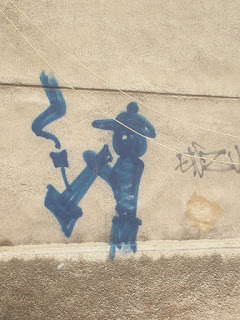
In his marvelous – there will be a lot of marvelouses during this journey – Shakespeare and the Origins of English, Professor Neil Rhodes writes: “Watching television has long assumed the role that novel-reading did in the early nineteenth century, while in some quarters reading a book now seems to be as arduous an activity as writing was in the bone-chilling abbeys of the eleventh century…” And it’s hard not to agree (apart from the fact that internet exploration is cutting fast into that television viewing) as we lurch into beach-book lite-reading, I-Podded against the sound of the sea, too tired by everyday life.
And perhaps that’s why the first manifestation of my journey is via the current medium of intransience and speed, the web. I say current because something will replace it, at sometime – perhaps even in our lifetimes. Or merely augment: just as cinema seemed so destructive to the photographer, and photography to the painter, so the web appears to spell the end of books. I don’t think so. Not yet.
Coryat’s generation were faced with similar issues: what is Hamlet’s dilemma but in part a strong unease with theatre, the courtly rhetoric of Elizabethan “media”; what is Prospero’s island problem but a realization that magic – art – is not enough?
T.S Eliot in The Sacred Wood says, and I’m quoting Professor Rhodes’ edit: “The Elizabethan age in England was able to absorb a great quantity of new thoughts and new images, almost dispensing with tradition, because it has this great form of its own which imposed itself on everything that came to it…To have, given into ones hands a crude form, capable of infinite refinement, and to be the person to see the possibilities – Shakespeare was very fortunate.”
So we’re not the first to be overwhelmed with stuff; nor to learn – in time, I hope – that as another literary critc, Kenneth Muir, writes, “The great poet is the one who forgets most.” He alludes I think to Ovid’s Narcissus who complained plenty has made me poor. Or as Professor Rhodes puts it: “Creative forgetting remains the work of the human imagination.”
So what to forget, what to remember, with this new “great form” that is digital communication? And what to explore in the past as I live absolutely for the minute, carpe diem-ing away my five months in Europe armed with the virtual history of the world at the end of my computer? Age means something: I’m fifty soon, experience is important now. And the experience of the first three days tells me I have to forget a lot if I am to see clearly in the coming months.

1 comment:
sounds like your finding your groove. Dont mind if we tag along? Safe travels Robin!!
Steve and Alice down under
Post a Comment